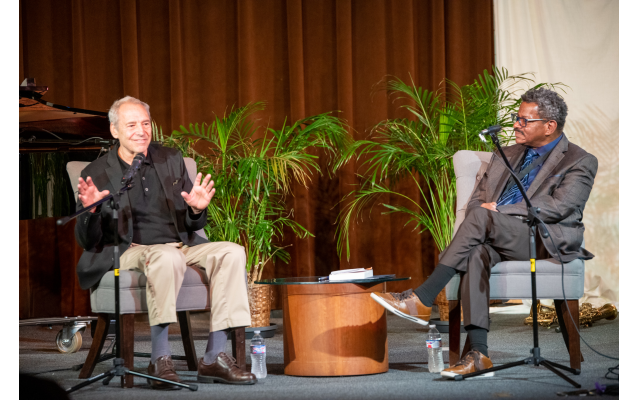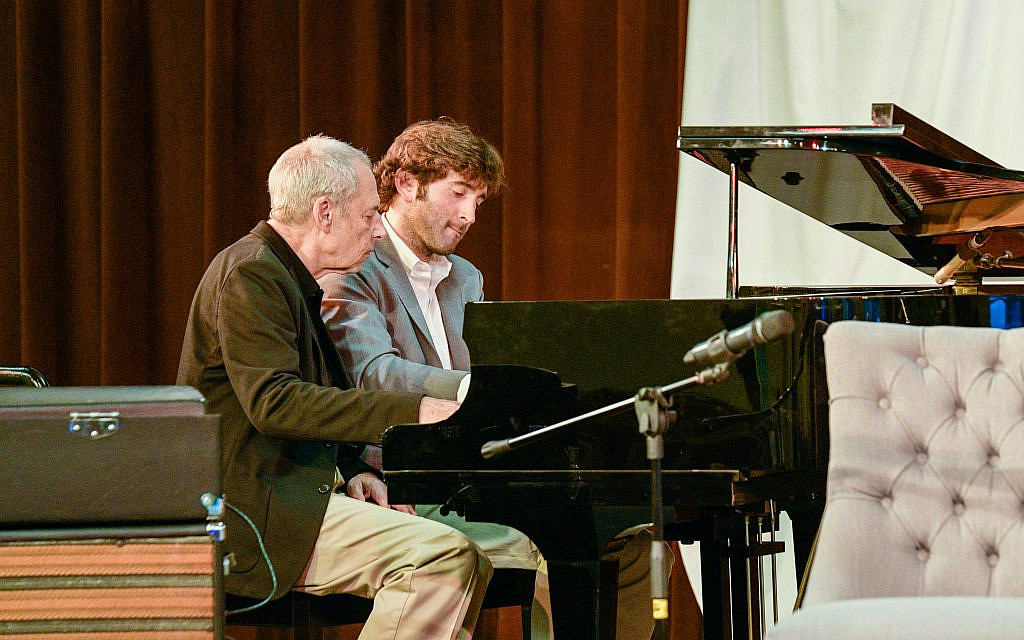American Pop Music: A Combination of Cultures
Ben Sidran and Rev. Dwight Andrews spoke about the mixing of Jewish and African American cultures through music and their worries about modern melodies.

The important influence that Jews and African Americans have shared in the development of American music was the subject of a thoughtful and occasionally provocative program last week.
The program Oct. 17 featured Ben Sidran, who has a long history as a successful composer, performer and producer of popular music recordings and the Rev. Dwight Andrews, the African American senior minister of the historic First Congregational Church in downtown Atlanta.
Sidran, who has a doctorate in American studies and was here earlier this year for the AJMF, characterized the relationship between Jews and African Americans as crucial in the development of American popular music.
“If it were not for African Americans and Jews,” he said, “there would be no popular music in America. What was here before blacks and Jews were bad versions of European culture — British dance hall music, Viennese waltzes and Gilbert and Sullivan, but it wasn’t specifically American.”
What he maintained in his conversation with the Rev. Andrews is that American Jewish immigrants from Eastern Europe in the late 19th and early 20th centuries recognized the economic potential of popular music. They brought what he described as an ability to monetize the performance of music, so performers were able to share in the success of the music they both created and performed.
But business innovation was only part of what Jews in America brought to popular music. Because of their familiarity with the tunes that they created in Eastern Europe, they contributed, in Sidran’s eyes, to the development of a sound firmly grounded in the fundamentals of Western musical harmony.
Jews who shared a natural affinity with African Americans as fellow outsiders in American life married their musical knowledge with the rhythmical tradition that blacks had brought with them from Africa, what Sidran called their “Africanisms.”
“When you take the Africanisms and put it together with Western harmony you come upon the inventions of such composers as Jerome Kern, George Gershwin, Irving Berlin, and Harold Arlen. Pop music is built on a template of the yearning of Jews and their emotions as well as this harmonic sense from their tradition.”
African Americans shared with Jews in America more than a hundred years ago the status for the most part of an underclass. But unlike Jews, according to the Rev. Andrews, hundreds of years of slavery had stripped blacks of their heritage. Nonetheless, they absorbed the many influences of this new world they inhabited to create distinctly American forms of music that resonated so strongly with Jews.
“The blues represent for African Americans a space where there is no space,” Andrews maintained.
Both Sidran and Andrews, in their observations, are solidly grounded in an academic environment. In addition to his doctorate, Sidran has a strong background in performance and recording. His authoritative work, “There Was a Fire: Jews, Music and the American Dream,” was a finalist for the National Jewish Book Awards.
Andrews also holds a doctorate in music and teaches music at Emory University. He’s an accomplished saxophonist who hosts Friday night jam sessions at his church.
But despite the great history of American popular music over the last 150 years, both Sidran and Andrews were pessimistic about the future.
Sidran said, “I despair because there is no cultural memory in our music anymore. There is no sense of ease, only a sense of anxiety. It’s like we’re all suffering from a kind of post-traumatic- stress disorder. Everyone is on edge.”
Andrews is particularly concerned about how the acceptance of violence has been made such an important part of the message of popular music today. It has become, he believes, just another commodity to be sold to a gullible public.
“Once you commodify violence and say violence sells, it sells well. Once you buy violence and you can separate that from any sense of cultural memory, it doesn’t matter what ethnicity you are, you are pounding away at our humanity.”
Bringing the two music experts together in a nontraditional setting is part of an ambitious new direction for the Atlanta Jewish Music Festival.

Festival director Joe Alterman, who is also a popular jazz pianist with strong professional credentials, is excited and eager to take the festival in new directions.
“Our program was done at the First Congregational Church to purposely involve a more diverse audience for our programs. Something we will continue to do as we move forward.”
“This free event was planned, developed and sponsored by The Breman Museum as part of its Breman on the Road series along with the Atlanta Jewish Music Festival and the First Congregational Church.”
Bob Bahr is teaching four classes on “Movies, Music and Spirit – The Southern Roots of an American Revolution 1945-1960” at the National Center for Civil and Human Rights in Atlanta beginning next month.



comments